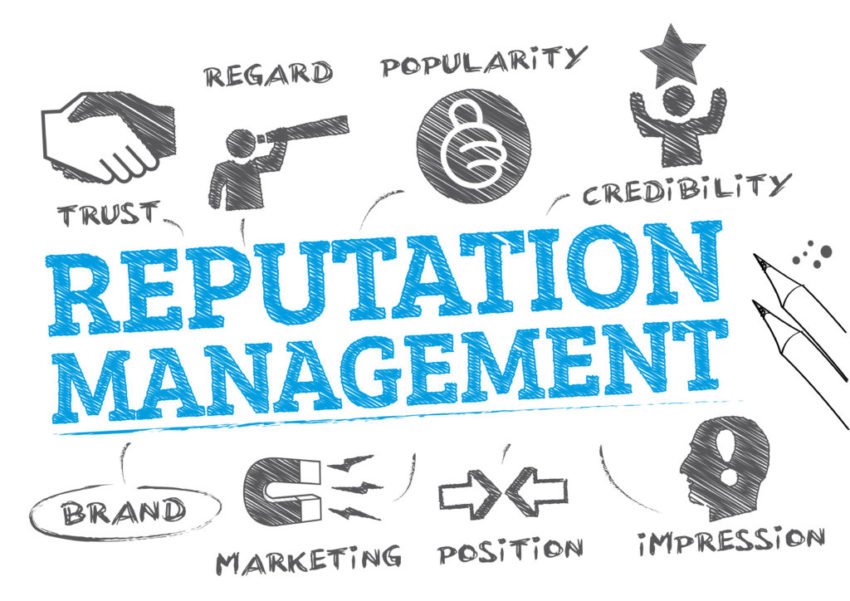Corporate Reputation Management
As customers increasingly make purchase decisions based on brand or corporate reputation and trust in businesses as an institution remains low, corporate reputation management has become essential to any successful business strategy.
Corporate reputation management is the process of monitoring and evaluating people’s opinions about the business.
It requires the business to listen to those who support it to shape its image and message in public.
It can be beneficial in expanding brand presence online, controlling the key message, and increasing investor confidence.
What is corporate reputation?
Corporate reputation is the overall opinion of a company’s internal and external stakeholders based on past actions and anticipated future behavior.
It is a crucial factor of digital marketing that helps companies understand their audience and seek their real opinions.
Companies invest in qualitative measures such as focus groups and other strategies to measure people’s opinions and their reasons for buying or not buying a product.
Monitoring customer feedback and online reviews indicates what people think about a company and its reputation.
Corporate reputation comprises how stakeholders perceive and feel about a brand, shaped by its performance, culture, environment, products/services, and leadership over time.
Influencers of a company’s reputation include news and information available online and how people engage with the company.
Maintaining a positive corporate reputation is essential to attract potential customers, creating customer loyalty, and finding the expertise needed to innovate and implement proper business operations.

Why is corporate reputation important?
If you are wondering ‘why is reputation important?’ Let us break it down for you.
Corporate reputation is an invaluable asset for businesses of all sizes and industries.
A strong corporate reputation can bring many benefits, such as:
- increased sales
- customer loyalty
- access to top talent
- increased company market value
- new market opportunities
It can also help to attract potential customers and employees, inspire consumer confidence, and build brand trust.
On the other hand, a negative corporate reputation can have the following:
- devastating consequences
- such as lower sales
- decreased brand trust
- decreased company value
Recent statistics show that many business leaders consider reputation management a high priority, and almost 70% of job seekers would reject a job offered by a company with a bad reputation.
Additionally, 95% of users don’t look past the first page of Google search results, and 54% of consumers use social media to research products.
Attracting new customers and employees will be hard if your company has a bad reputation and is labeled as one of the bad brands.
This highlights how important it is for companies to manage their corporate reputation and protect their brand.
Companies need to take the time to monitor their reputation, respond to customer reviews, and fix any issues that could harm their brand.
It is also important to be proactive and create a positive image for the company.
This can be done by engaging with customers, promoting positive reviews, and utilizing social media.
Ultimately, companies must invest in corporate reputation management to protect and enhance their brand.

What is the difference between corporate image and corporate reputation?
The difference between corporate image and reputation lies in the scope and nature of what they represent.
Corporate image is the overall public perception of a business based on visual, emotional, and cognitive associations. It is created through the company’s branding and marketing efforts and can be seen in its logo, website, advertisements, etc.
On the other hand, corporate reputation is the overall estimation in which an organization is held by its internal and external stakeholders based on its past actions and the probability of its future behavior.
It is based on the company’s performance and can be seen in reviews, customer feedback, and online sentiment.
Though these elements are important to a company’s success, they have different impacts.
The corporate image helps to create a public perception that customers can relate to and trust, while corporate reputation helps to build customer loyalty and attract top talent.
A company with a good corporate reputation will likely generate a good corporate image and vice versa.
Companies should always be aware of their corporate image and reputation as they are both key influencers on the overall value of their company.
What does a reputation manager do?
A reputation manager is a person or a team responsible for managing and monitoring a company’s online presence and reputation.
This includes tracking public perceptions and conversations, responding to reputation threats, and taking proactive steps to boost the reputation of the organization and its brands.
Through the use of digital tools such as social listening, audience sentiment analysis, and media monitoring, a reputation manager can track how people view the company and make sure any negative reviews, comments, or press doesn’t damage its brand.
Reputation management is a valuable part of a company’s overall strategy, as it helps them stay competitive in the digital world and build credibility among stakeholders.

What are the 4 elements of corporate reputation?
The four elements of corporate reputation are products and services, workplace environment, vision and leadership, and financial performance and stability.
Products and services refer to the quality of a company’s products or services, which are essential to its reputation.
The workplace environment is how the company treats its employees and is an important factor in how the public perceives the company.
Vision and leadership refer to the company’s executives and their ability to lead it toward its stated goals.
Finally, financial performance and stability are important factors, as a company must employ sound fiscal practices and maintain a stable financial position to remain attractive to potential customers and investors.
10 effective corporate reputation management strategies
Companies must protect their reputation and create a strong online presence in the constantly changing business environment.
Corporate reputation management strategies are essential to safeguarding a company’s brand and standing in the industry.
These strategies can help build investor confidence, improve customer loyalty, and give companies an edge against their competitors.
Let’s discuss 10 effective corporate reputation management strategies for improving your company’s reputation.
1. Monitor reputation using social media monitoring and analysis tools
Monitoring and analysis tools can be incredibly helpful in corporate reputation management.
By using sophisticated monitoring and analysis tools, companies can collect and analyze online reviews to understand what customers say about the brand.
These tools can also provide insights that are invisible to the human eye.
This data can be used to craft a brand image that positively affects company revenue and market value.
Monitoring and analysis tools can also help companies to counteract any negative information about their company by using positive news to outweigh any negatives.
Additionally, these tools are useful for understanding how people perceive the brand by looking at search results in different locations.
Ultimately, monitoring and analysis tools can be the key to effective corporate reputation management success.
2. Develop a strategy to manage your corporate reputation
Devel oping a strategy to manage your company reputations can help you in multiple ways.
- It can help you expand your brand presence online and control your key message, essential for establishing a strong presence in the market and increasing brand recognition.
- It can help counteract any negative information that may be out there about your company, either by providing positive news that will outweigh the negatives or by actively managing your review presence.
- A good corporate reputation can help increase sales, strengthen customer loyalty, attract top talent, and increase company market value, leading to increased revenue.
- A successful corporate reputation management strategy can open up new market opportunities you may not have had otherwise.
3. Engage with your stakeholders
Engaging with stakeholders is essential for improving corporate reputation.
When stakeholders interact positively with the company, it builds trust and creates an emotional appeal that can lead to higher customer sales.
Furthermore, engaging with stakeholders can help your business build a positive image by being a responsible corporate citizen, promoting ethical business practices, integrity, and humanizing branding.
Lastly, engaging with stakeholders can ensure that the company remains financially sound, as stakeholders will be more likely to invest in a company they trust.
Overall, engaging with stakeholders can help boost corporate reputation by increasing trust, creating an emotional appeal, and providing financial stability.

4. Use social media to spread positive messages about your brand
Social media can spread positive messages about a brand by effectively communicating during a crisis and building a strong online presence.
Companies should do the following:
- claim and optimize their social media accounts
- publish positive content
- build brand authority
- monitor and respond to online mentions
- drive positive reviews on all platforms
- respond to negative reviews and comments
- correct false negative content
- use SEO to improve search results
Additionally, connecting with the audience through a well-developed brand story, transparent leadership, and strong corporate values enforced from the top down can generate a positive and effective emotional appeal.
5. Monitor your competition’s reputation
Monitoring your competition’s reputation can help you with corporate reputation management by:
- providing useful, actionable insights into your rivals’ performance
- brand messaging consistency
- current levels of brand recognition
- the quality of sentiment they’re producing among key segments of your target audience
This can help you more accurately assess how your business is progressing versus local and national competitors so that you can make adjustments to improve your brand image and reputation.
A good reputation can increase sales, attract top talent, and open up market opportunities, while a bad reputation can cause customers to lose trust and move on quickly.
Corporate reputation management helps you control your brand’s key message, counteract any negative information about your company, and craft a brand image that positively affects your company’s market value, revenue, and talent retention.
6. Use research to gauge your reputation
Research can help gauge a company’s corporate reputation by providing insight into consumer perceptions of the company.
With detailed research into the company’s online presence, social media presence, and customer reviews, businesses can gain valuable insights into how the public perceives their brand.
Companies can use this information to change their products, operations, leadership, or culture to improve their image.
Additionally, research can help companies identify potential reputational company crises and take action to prevent or mitigate potential damage.
Research can also provide a more objective measure of a company’s true worth, as it considers consumer sentiment, investor relations, and share price.
Ultimately, research can help gauge a company’s corporate reputation by providing insight into consumer perceptions and helping the company make decisions to improve its image and overall value.

7. Respond promptly to breaches of reputation
It is extremely important to respond promptly to breaches of reputation, as the consequences of not doing so can be severe.
A company’s damaged reputation can lead to reduced customer confidence, lower sales and profits, fewer investment opportunities, and, in extreme cases, serious legal consequences.
Therefore, it is essential to have an effective early-warning system that can alert executives quickly of any reputational problems.
With the increasing significance of web-based participatory media and NGOs, traditional public relations tools are becoming less effective in addressing these issues.
Companies must therefore step up their reputation-management efforts and coordinate across functional teams to gather intelligence and respond quickly to reputational challenges.
Moreover, CEOs must demonstrate real statesmanship, as the public will expect nothing less in today’s charged environment.
By taking proactive steps to protect their reputation and respond to challenges promptly, companies can go a long way in rebuilding public trust and commitment to free markets.
8. Utilize public relations techniques
Public relations techniques can be very effective for corporate reputation management by helping shape a brand’s consumer perception.
PR tactics such as leveraging grassroots support, partnering with NGOs, targeting opinion leaders, and engaging in two-way dialogue with consumers can help to spread positive messages about a company and dispel misunderstandings.
Additionally, using public relations techniques can help a company to get its side of the story out quickly when crises occur and to start conversations with consumers.
Ultimately, these techniques can help to create an overall positive perception of the company, thus helping to improve its reputation.
9. Integrate reputation management into the entire company
Integrating reputation management into the entire company can help corporate reputation management in several ways.
Firstly, it allows companies to shape the narrative around their brand and control the key message they want to portray.
This can be done by expanding the brand presence online and correcting any incorrect or outdated information that may be present.
Secondly, it helps to counteract negative information about the company by using positive news to drown out the negatives.
Finally, it helps to build consumer trust, as customers are more likely to be loyal to a company or brand they are familiar with and comfortable with.
In addition, a big reputation can help attract potential top-tier employees and boost staff retention, as well as attract suppliers, partners, and vendors who are more likely to work with a reputable business.
All of these factors can help enhance a company’s overall online and in-person reputation and ultimately lead to increased profits and market value.
10. Develop a resource library
Developing a resource library can be a great way to help manage corporate reputation, as it can provide a wealth of information for customers and potential customers to draw upon.
A resource library can help to present a company’s values, ethical stance, and quality standards in a way that can be easily accessed and understood.
It can also help to build a company’s brand presence and create trust with customers by providing reliable sources of information that can be referenced whenever needed.
A resource library can also showcase a company’s commitment to its community and positive actions such as disaster relief efforts, charity events, or plastic-free campaigns.
By providing a resource library, companies can demonstrate their ethics and show a commitment to the community, leading to a stronger corporate reputation and attracting customers who care deeply about what a business stands for.







